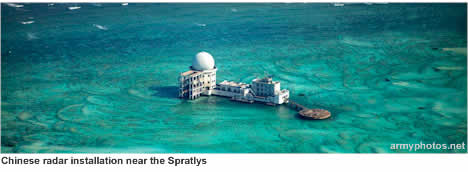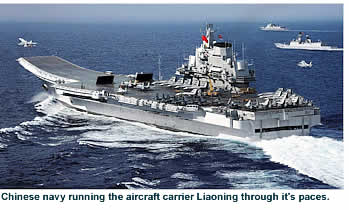|


 he arrogance of China is
becoming readily apparent with each passing day. With their newly acquired
economic and military power the Chinese appear unrestrained in their
assertiveness towards their neighbors. China, instead of positioning itself
as a 21st century superpower appears to be turning back the clock resembling
more and more the 12th century empire of Genghis Khan and the Mongol hordes
who conquered most of Eurasia...just because they could. Today's China it
seems adheres to the philosophy that "might makes right." And since it has
the biggest "guns" in the region it can do or take whatever it wants. he arrogance of China is
becoming readily apparent with each passing day. With their newly acquired
economic and military power the Chinese appear unrestrained in their
assertiveness towards their neighbors. China, instead of positioning itself
as a 21st century superpower appears to be turning back the clock resembling
more and more the 12th century empire of Genghis Khan and the Mongol hordes
who conquered most of Eurasia...just because they could. Today's China it
seems adheres to the philosophy that "might makes right." And since it has
the biggest "guns" in the region it can do or take whatever it wants.
Is this a superpower's
prerogative as the Chinese might argue? In similar fashion, for most of the
20th Century, the United States saw the Caribbean Sea as its own private
"sandbox" where it would operate unimpeded. However, the US—although it
could have—never operated with the arrogance and impunity that China
currently displays. It has the most powerful navy in the region so it
intimidates all its neighbors.
And the Chinese seem to
derive perverse pleasure from picking on Filipinos in particular. Robert D.
Kaplan, recognized as one of the world's "top 100 global thinkers" by Foreign Policy magazine in 2011, and a member of an advisory committee to
the US Department of Defense notes in his book Asia's Cauldron that "the
truth was, that pushing the Philippines around served a purpose in
nationalistic circles in Beijing that pushing Vietnam around just didn't.
Hating Vietnam was a default emotion inside China and therefore did not
advance any Chinese official's or military officer's nationalistic bona
fides; whereas because the Philippines was a formal treaty ally of the
United states, bullying the Philippines telegraphed that China was pushing
back at the United States. And this was easy to do because of the Philippine
military's own lack of capacity."
In addition, based on
China's dealings with the Philippines during the Gloria Macapagal-Arroyo
administration, they must have likewise concluded that Philippine government
officials, from the president on down are both corrupt and gullible. After
years of the Philippines telling its ASEAN neighbors to stand united against
China, Arroyo suddenly broke ranks in 2004 to make a secret deal with China
and Vietnam called the Joint Marine Seismic Undertaking (JMSU). Even members
of the Philippine Senate and House of Representatives were kept in the dark
as to the details of this joint undertaking. The secret project abruptly
ended in early 2008 after an article published in the Far Eastern Economic
Review characterized the project as a "sellout" by the Arroyo administration
to China and Vietnam. The late Barry Wain, a well-respected researcher from
the Institute for Southeast Asian Studies in Singapore authored the article
noting that "the Philippines ... has made breathtaking concessions in
agreeing to the area for study, including parts of its own continental shelf
not even claimed by China and Vietnam." It is no wonder Arroyo wanted to
keep everything under wraps! Now remember to include treason to the list of
charges being leveled against her.
The JMSU and the NBN-ZTE
scandal that soon followed gave Chinese leaders the first-hand experience
they were looking for when dealing with the top echelons of the Philippine
government. And they may have likely concluded that getting Filipinos to do their
bidding would be a cakewalk so long as you "greased" enough palms.
 The fact
that this current Aquino administration has shunned corruption does not mean
that future ones will. But China does not even have to wait for a new
Philippine administration it can bribe. China can simply continue with its
"salami slicing" strategy, grabbing one small island after another until
it eventually controls everything it wants. A war weary United States will
likely not confront China or even come to the aid of its treaty partner
especially when that partner is in a hole it dug for itself when it forced
the US military to leave in 1991. The fact
that this current Aquino administration has shunned corruption does not mean
that future ones will. But China does not even have to wait for a new
Philippine administration it can bribe. China can simply continue with its
"salami slicing" strategy, grabbing one small island after another until
it eventually controls everything it wants. A war weary United States will
likely not confront China or even come to the aid of its treaty partner
especially when that partner is in a hole it dug for itself when it forced
the US military to leave in 1991.
Even Chinese-Filipino
business leaders who now control much of the country's commerce and industry
are unlikely to show overt support for the Philippine cause for fear
they may be blacklisted from doing business in China. The only viable option
open to the Philippines was to run to the United Nations and seek
arbitration. Any decision from the UN's Permanent Court of Arbitration is at
least a year away but China has already made clear it will not abide by the
UN court's ruling.
In the recently concluded
regional security summit at Naypyidaw, Myanmar, China's Foreign Minister
Wang Yi hinted that China would be willing to halt activity in disputed
areas of the South China sea if the Philippines withdraws its arbitration
case in the UN. Hoping that Filipino officials take the bait, and drop their UN
suit, it is highly unlikely however that China will give up its plan to
dominate the entire South China Sea.
Where does all this lead
to? It is difficult to say at this point but one thing is for sure. The
bucolic, laidback lifestyle of the average Filipino will most certainly have
to change. And that in itself might be the best thing to happen in a long,
long while.
Published 08/12/2014
|